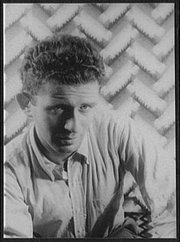Norman Mailer
|
|

Norman Kingsley Mailer (born January 31, 1923) is an American writer and innovator of the nonfictional novel.
Norman Mailer was born in Long Branch, New Jersey. He was brought up in Brooklyn and began attending Harvard University in 1939, where he studied aeronautical engineering. At the university he became interested in writing and published his first story when he was 18.
Mailer was drafted by the army in World War II and served in the South Pacific. In 1948, just before enrolling in the Sorbonne in Paris, he wrote a book that made him world-famous: The Naked and the Dead, based on his personal experiences during World War II. It was hailed by many as one of the best American novels to come out of the war years and named one of the "100 best novels" by the Modern Library.
In the following years, Mailer worked as a scriptwriter in Hollywood. Much of his work was refused by many publishers. But in the mid 1950s he became famous as an anti-establishment essayist, and he was one of the founders of The Village Voice in 1955[1] (http://www.villagevoice.com/aboutus/). In pieces such as The White Negro: Superficial Reflections on the Hipster (1956) and Advertisements for Myself (1959), Mailer examined violence, hysteria, crime, and confusion in American society.
Other famous works include: The Deer Park (1955), An American Dream (1965), Why Are We in Vietnam? (1967), Armies of the Night (1968), (awarded a Pulitzer Prize and National Book Award), Miami and the Siege of Chicago (1968), Of a Fire on the Moon (1970), The Prisoner of Sex (1971), The Executioner's Song (1979) (awarded a Pulitzer Prize), Ancient Evenings (1983), and Harlot's Ghost (1991).
A number of Mailer's works, such as Armies of the Night are of a political nature. He established a reputation for political reportage, covering the Republican and Democratic National Conventions in 1960, 1964, 1968, 1972, 1992 and 1996. In 1967, he was arrested, briefly, for his involvement in anti-Vietnam demonstrations. Two years later, he ran unsuccessfully as an independent for Mayor of New York City allied with columnist Jimmy Breslin running for City Council President, with the agenda of New York City secession as the 51st state.
In 1980, Norman Mailer supported convicted killer Jack Abbott's bid for parole, which was successful. He helped Abbott publish a book titled In the Belly of the Beast, a collection of his letters to Mailer about his experiences in prison. However, Abbott committed a murder not long after his release and was returned to prison. Mailer was subjected to some criticism for his role in getting Jack Abbott released and in a 1992 interview in Buffalo News, Mailer said that his involvement with Abbott was "another episode in my life in which I can find nothing to cheer about or nothing to take pride in."
Mailer is also noted as a biographer. His subjects have included Marilyn Monroe, Pablo Picasso, and Lee Harvey Oswald.
Norman Mailer has been married six times, including, since 1980 to Norris Church, and has nine children.
In 1960, Mailer stabbed his second wife Adele with a penknife at a party. She was not seriously injured.
Mailer appears in the documentary film When We Were Kings and is quickly mentioned in the song "Give Peace a Chance" by John Lennon and "A Simple Desultory Philippic (Or How I Was Robert McNamara'd Into Submission) (http://sglyrics.myrmid.com/parsley.htm#track09)" by Simon & Garfunkel.
Since May 2005 he's been a contributing blogger at The Huffington Post.
External link
- Full biography, photo gallery and online video available at Achievement.org (http://www.achievement.org/autodoc/page/mai0int-1)
- 1991 audio interview of Norman Mailer by Don Swaim of CBS Radio, 56 min., RealAudio (http://wiredforbooks.org/normanmailer/)fr:Norman Mailer
de:Norman Mailer eo:Norman MAILER ja:ノーマン・メイラー nn:Norman Mailer fi:Norman Mailer sv:Norman Mailer
